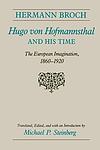Hermann Broch
Hermann Broch was an Austrian writer, considered one of the major Modernist authors. Born on November 1, 1886, in Vienna, he was known for his deep philosophical and psychological novels, which explored the crisis of values and the individual's role in society. His most famous work is 'The Sleepwalkers' trilogy, which examines the moral history of Germany from 1888 to 1918. Broch also wrote 'The Death of Virgil', a novel that is both a poetic recasting of Virgil's last days and a profound meditation on art and mortality. He died on May 30, 1951, in New Haven, Connecticut.
Books
This list of books are ONLY the books that have been ranked on the lists that are aggregated on this site. This is not a comprehensive list of all books by this author.
-
1. Death of Virgil
The novel explores the final hours of the Roman poet Virgil, who, while on his deathbed, contemplates the value and impact of his life's work, particularly his unfinished epic, the Aeneid. The narrative is a complex, stream-of-consciousness meditation on art, life, and death, with Virgil wrestling with his desire to burn his epic and the emperor's command to preserve it. The book delves into themes of the meaning of human existence, the role of art in society, and the clash between the individual's inner world and the external world.
-
2. The Sleepwalkers
"The Sleepwalkers" is a trilogy that explores the psychological transformation and moral decay of German society between 1888 and 1918. The narrative follows three main characters: Joachim von Pasenow, a romantic military officer; August Esch, a pragmatic bookkeeper; and Claus von Pasenow, an intellectual and World War I soldier. The book uses these characters to depict the shift from a stable, traditional society to a modern, aimless one, examining the individual's struggle with societal change and the disintegration of values.
-
3. The Guiltless
"The Guiltless" is a novel that explores the disintegration of values and the rise of fascism in Germany between the two World Wars. It follows the lives of several characters, including a businessman, a musician, and a murderer, whose stories intertwine to paint a picture of a society in moral and social decline. The narrative delves into their personal struggles and moral dilemmas, reflecting the broader societal issues of the time and offering a critique of the political climate that allowed for the rise of totalitarian regimes.
-
4. Hugo Von Hofmannsthal And His Time
The book provides a comprehensive examination of the life and work of a prominent Austrian writer and his influence during a period of significant cultural and intellectual change in early 20th-century Europe. It delves into the writer's relationships with contemporaries, his contributions to literature and drama, and his role in the broader context of the modernist movement. The author critically assesses the writer's legacy, exploring the complexities of his artistic endeavors and the societal shifts that shaped his era, offering readers a detailed portrait of a man whose work encapsulated the spirit of his time.



